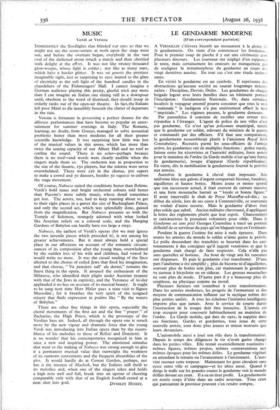MUSIC Verdi at Verona
IMMEDIATELY the floodlights that blinded our eyes so that we might not see the scene-setters at work upon the stage went out, and before the overture began, everybody in the vast oval of the darkened arena struck a match and then chortled with delight at the effect. It was not like twenty thousand glow-worms, whose light is colder ; nor like as many stars, which have a harder glitter. It was sui generis the prettiest imaginable sight, just as surprising to eyes inured to the glare of electricity as the soft light of the hundred candles in the chandeliers of the Fishmongers' Hall. I cannot imagine a German audience playing Ibis pretty, gleeful trick any more than I can imagine an Italian one sitting still in a downpour until, obedient to the word of dismissal, they should troop in orderly ranks out of the open-air theatre. In fact, the Italians left poor Mimi to die inaudibly beneath the clatter of departure in the rain.
Verona is fortunate in possessing a perfect theatre for the alfresco performances that have become so popular an enter- tainment for summer evenings in Italy. The Romans, learning, no doubt, from Greece, managed to solve acoustical problems better than most modems for all their greater scientific _knowledge. It was surprising how little was lost of the musical values in this arena, which has more than twice the seating capacity of our Albert Hall and no roof to confine the sound. There is no echo—perhaps because there is no roof—and words were clearly audible when the singers made them so. The orchestra was in proportion to the size of the theatre, 15o players, but the soloists were never overwhelmed. There were 25o in the chorus, soo supers to make a crowd and 5o dancers, besides 5o ragazzi to enliven the stage movement.
Of' course, Nabucco suited the conditions better than Bohime. Verdi's bold tunes and bright orchestral colours told better than Puccini's more subtle music, whose _detail sometimes got lost. The actors, too, had to keep running about to get to their right places in a garret the size of Buckingham Palace, and only the second act, which was splendidly done, gained from the magnification. But Nabucco presents us with the Temple of Solomon, strangely adorned with what looked like Assyrian reliefs on a colossal scale, and the Hanging Gardens of Babylon can hardly have too large a stage.
Nabucco, the earliest of Verdi's operas (for we may ignore the two juvenile pieces which preceded it), is not among his greater achievements. But it must always hold a special place in our affections on account of the romantic circum- stances of its composition after the young man, overwhelmed by the sudden loss of his wife and children, had vowed he would write no more. It was the casual reading of the lines allotted to the chorus of exiled Jews that fired his imagination, and that chorus, " Va pensiero sull' ale dorati," remains the finest thing in the opera. It aroused the enthusiasm of the Milanese, who identified their plight under Austrian tyranny with that of the Jews in captivity, and the Veronese of today applauded it no less on account of its musical beauty. It ought to be sung next time Herr Hitler pays a state visit to SignOr Mussolini ; for it breathes the very spirit of the resigned misery that finds expression in psalms like " By the waters of Babylon."
There are other fine things in this opera, especially the choral movements of the first act and the fine " prayer" of Zacharias, the High Priest, which is the prototype of the Verdian bass air. Indeed, all through the opera one is struck more by the new vigour and dramatic force that the young Verdi was introducing into Italian opera than by the resem- blance of his melodies to those of Bellini and Donizetti. It is no wonder that his contemporaries recognised in him at once a new and inspiring power. The emotional stimulus that went to the making of Nabucco was strong enough to give it a permanent musical value that outweighs the weakness of its outworn conventions and the frequent absurdities of the plot. It would hardly do at Covent Garden, perhaps, nor has it the interest of Macbeth, but the Italians still thrill to its melodies and, when one of the singers takes and holds a high note well and full, break into an uproar of cheering comparable only with that of an English football crowd at a


































 Previous page
Previous page